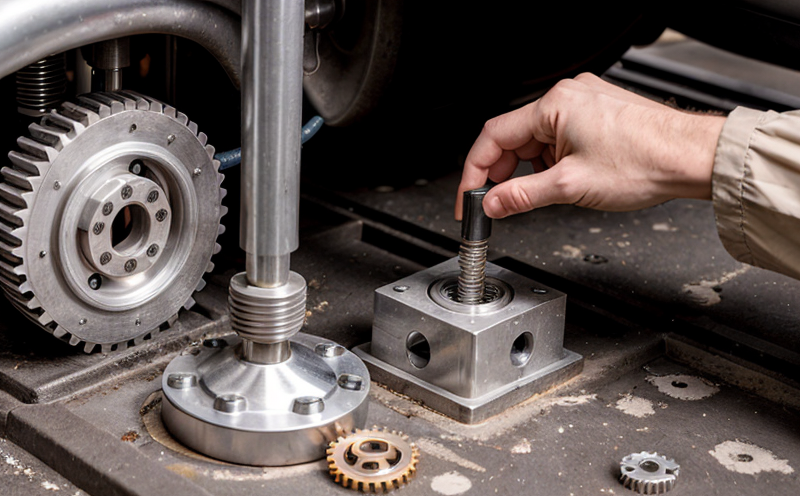ISO 9712 Mechanical Testing Personnel Qualification
The ISO 9712 standard is a globally recognized framework that ensures the competence and qualification of personnel involved in non-destructive testing (NDT) methods. In the context of additive manufacturing and 3D printing, this certification guarantees that professionals are capable of performing mechanical property tests accurately and reliably. This service focuses on ensuring compliance with the stringent requirements outlined by ISO 9712 for those who will be conducting mechanical testing.
The standard covers several aspects critical to the qualification process, including:
- Physical and mental health of personnel
- Educational background and experience in NDT
- Training provided by qualified instructors
- Preliminary examinations to assess knowledge and skills
- Practical tests on specified test pieces
- Continuous assessment and requalification
The qualification process is designed to ensure that only competent individuals are performing mechanical property testing. This not only enhances the reliability of results but also ensures safety standards in critical applications.
Mechanical property tests, as defined by ISO 9712, encompass a variety of assessments aimed at evaluating materials and components for their strength, hardness, ductility, impact resistance, and fatigue life. These tests are crucial in ensuring the quality and reliability of products used across various industries.
For additive manufacturing and 3D printing, mechanical property testing is essential because these processes often involve complex geometries and materials that can be challenging to characterize. By adhering to ISO 9712 standards, we ensure that personnel conducting these tests are thoroughly trained and qualified. This process enhances the confidence in the results obtained from such testing.
The standard also emphasizes continuous improvement through periodic requalification. This ensures that as new technologies and methods emerge, personnel remain up-to-date with the latest practices and techniques. This is particularly important in rapidly evolving fields like additive manufacturing where innovation can lead to significant changes in how materials are tested and evaluated.
Industry Applications
The application of ISO 9712 mechanical testing personnel qualification is widespread across multiple sectors including aerospace, automotive, medical devices, and manufacturing. In these industries, the reliability and integrity of materials are paramount to ensure product safety and performance.
In aerospace, for instance, components must withstand extreme conditions such as high temperatures and pressures. Ensuring that the personnel involved in testing these parts meet ISO 9712 standards helps maintain the highest level of quality assurance. This is crucial not only for maintaining the reputation of manufacturers but also for ensuring compliance with international aviation regulations.
In automotive, mechanical property tests are essential to ensure that parts can withstand rigorous conditions during manufacturing and use. By qualifying personnel according to ISO 9712 standards, automotive companies can enhance their production processes, leading to safer vehicles and more efficient testing protocols.
The medical devices sector also relies heavily on mechanical property testing to ensure the safety and efficacy of products. The qualification process under ISO 9712 ensures that personnel are capable of conducting these tests accurately and reliably, thereby contributing to patient safety.
In manufacturing, particularly in industries that incorporate additive manufacturing techniques, the use of qualified personnel is critical for ensuring product quality. This includes not only the mechanical property testing but also other aspects such as dimensional analysis and surface integrity evaluation.
Quality and Reliability Assurance
The ISO 9712 qualification process plays a vital role in assuring quality and reliability by ensuring that only competent personnel are involved in mechanical property testing. This is achieved through rigorous training, assessment, and continuous evaluation.
Rigorous training ensures that personnel have the necessary knowledge and skills to perform tests accurately and reliably. The training program covers various aspects of NDT methods, including practical applications on test pieces. This hands-on experience is crucial for developing proficiency in conducting mechanical property tests.
Assessment through preliminary examinations helps identify any gaps in knowledge or skill that need addressing before proceeding with more advanced testing techniques. Practical tests on specified test pieces further reinforce this learning process by providing real-world scenarios to practice and refine skills.
Continuous assessment ensures that personnel remain up-to-date with the latest practices and techniques, especially important given the rapid advancements in additive manufacturing technologies. This continuous improvement process is essential for maintaining high standards of quality and reliability in mechanical property testing.
Use Cases and Application Examples
| Application Case | Description |
|---|---|
| Aerospace Component Testing | In the aerospace industry, mechanical property tests are conducted on components such as engine parts and structural elements. These tests ensure that materials can withstand high stresses without failure. |
| Automotive Part Evaluation | For automotive applications, testing focuses on evaluating the strength and durability of various components like gears and axles under simulated operational conditions. |
| Medical Device Safety Assessment | In the medical devices sector, mechanical property tests help assess the safety and efficacy of implants and surgical instruments by ensuring they meet stringent quality standards. |
| Manufacturing Process Optimization | In manufacturing, especially additive manufacturing, testing ensures that materials used in 3D printing processes are suitable for production. This includes evaluating the mechanical properties of newly developed alloys and composites. |
| R&D Innovation Validation | During research and development phases, ISO 9712 qualified personnel validate new materials and processes by conducting comprehensive mechanical property tests. This helps in refining designs for better performance and reliability. |
| Quality Control in Production | Continuous monitoring through mechanical property testing ensures that production lines meet specified quality standards, thereby preventing defects from reaching the market. |





